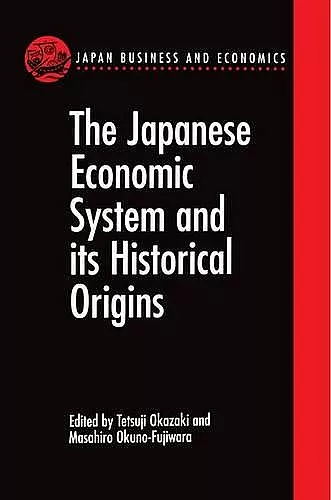The Japanese Economic System and its Historical Origins
Susan Herbert translator Tetsuji Okazaki editor Masahiro Okuno-Fujiwara editor
Format:Hardback
Publisher:Oxford University Press
Published:12th Aug '99
Currently unavailable, and unfortunately no date known when it will be back

Japan's rise from the ashes of defeat in the Second World War to its position now as one of the world's foremost economies has long been recognized as one of the most startling turnarounds of the 20th Century. With economic reform again at the top of the global agenda with the fall of the Soviet bloc and the continuing struggle of the developing nations, the lessons of Japan's success have never been more valuable. This volume looks closely at the origins of the current Japanese economic system, focusing particularly on the contrast between the war period of 1930-1945 and the preceding situation. The contributors argue that Japan had an `Anglo-Saxon model' economy until the 1930s, and that the special features of the Japanese system -- good labour relations; employee-based corporate governance; the main banks' financial system; and the principle of `administrative guidance' -- were all deliberately created during militarization. Although there are many post-war factors that have led to the present-day Japanese situation -- the Dodge Plan, high post-war inflation, new technology, massive shifts in the labour force, deregulation from the 1960s onwards -- without the reforms introduced between 1930 and 1945 there would be no `Japanese system'.
This remains a most significant work, essential reading for those who wish to understand the workings of the present-day Japanese economy. It may be added that the translation is excellent, and the book can be read with pleasure as well as profit. Malcolm Falkus, Business History
The editors provide a brilliant overview of the various issues. * Malcolm Falkus *
In the wake of late-twentieth-century Asian financial turmoil, this book provides a new arena for discussing the recovery of the Japanese economy. * Pui-Tak Lee, Enterprise & Society. *
This book ... is an excellent example of the range of areas and themes which trace the origis of Japan's present-day economic systems, in particular the financial and corporate systems, labour relations, and the relations between the government and the corporate sector. * May M.L. Wong, Asia Pacific Business Review, Vol.6, Spring/Summer 2000. *
for the general reader who may be curious about Japan's present-day economic system, this book provides valuable insightt into the general character of the Japanese economic system from the perspectives of its historical development. * May M.L. Wong, Asia Pacific Business Review, Vol.6, Spring/Summer 2000. *
the book is interesting and insightful in highlighting the Japanese economy's special features. It should prove to be useful especially for those interested in how to proceed with economic reform in Japan. * May M.L. Wong, Asia Pacific Business Review, Vol.6, Spring/Summer 2000. *
This book contains many carefully researched accounts of the evolution of the Japanese economy. * Jennifer L. Frankl, EH.NET, Aug 2000. *
ISBN: 9780198289012
Dimensions: 241mm x 164mm x 21mm
Weight: 600g
304 pages